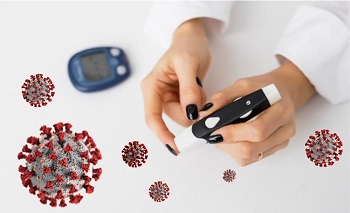COVID-19 News: Long COVID Researcher Warns That Both Vaccinated And Unvaccinated Are At Risk Of New Onset Of Diabetes Upon SARS-CoV-2 Exposure!
COVID-19 News - New Onset Diabetes In Long COVID Dec 04, 2022 2 years, 4 months, 2 weeks, 2 days, 5 hours, 5 minutes ago
COVID-19 News: A prominent and distinguished Long COVID researcher, Dr Ziyad Al-Aly from the Clinical Epidemiology Center, VA Saint Louis Health Care System, Missouri-USA and also the Institute for Public Health, Washington University in Saint Louis, Missouri-USA has warned that otherwise previously health individuals, irrespective if they were vaccinated or unvaccinated with the various COVID-19 shots, would be at very high risk of developing new onset of diabetes upon contracting SARS-CoV-2 infections.

He also warned that reinfections, which is the current norm due to the extensive variety of new emerging variants and sub-lineages that are more immune evasive, further increases the risk of developing new onset diabetes and also other Long COVID-19 issues.
Various previous studies that were covered in past
COVID-19 News coverages had shown different findings with regards to the percentage of people who develop new onset diabetes and also the duration of the condition and also when the disease developed after Post COVID.
https://www.thailandmedical.news/news/new-york-study-shows-almost-50-percent-of-covid-19-patients-will-develop-hyperglycemia-as-a-result-of-sars-cov-2-triggering-adipose-tissue-dysfunction
https://www.thailandmedical.news/news/german-study-warns-that-even-mild-sars-cov-2-infections-are-triggering-new-onset-type-2-diabetes-in-many
https://www.thailandmedical.news/news/breaking-medical-experts-warn-that-covid-19-could-trigger-diabetes-in-otherwise-healthy-individuals-who-never-had-the-condition-before-
https://www.thailandmedical.news/news/breaking-diabetes-and-covid-19-german-case-study--confirms-that-sars-cov-2-can-trigger-diabetes-in-young--adults-otherwise-healthy
https://www.thailandmedical.news/news/breaking-covid-19-latest-study-shows-patients-not-previously-diagnosed-with-diabetes-exhibiting-hyperglycemia-and-increased-mortality
https://www.thailandmedical.news/news/covid-19-research-cases-of-covid-19-patients-developing-diabetes-for-first
-time-can-be-due-to-high-ace2-expression-in-pancreatic-islet-cells-during-in
https://www.thailandmedical.news/news/breaking-covid-19-and-children-uk-researchers-warn-that-covid-19-could-be-linked-to-onset-of-type-one-diabetes-and-diabetic-ketoacidosis-in-children
https://www.thailandmedical.news/news/scientists-at-odds-on-what-s-causing-diabetes-in-covid-19-patients-as-two-studies-show-that-ace-2-is-not-expressed-in-pancreatic-beta-cells
https://www.thailandmedical.news/news/covid-19-news-doctors-worldwide-are-reporting-increases-of-new-onset-diabetes-cases-most-probably-triggered-by-covid-19
https://www.thailandmedical.news/news/coronavirus-news-cedars-sinai-medical-center-study-confirms-that-the-sars-cov-2-virus-infects-the-pancreas-directly
https://www.thailandmedical.news/news/study-warns-of-an-emerging-surge-in-diabetes-in-otherwise-healthy-individuals-as-a-result-of-covid-19
https://www.thailandmedical.news/news/covid-19-triggers-hyperglycemia-and-also-disrupts-fat-cells-and-causes-decreased-production-of-the-hormone-adiponectin-especially-in-severe-stages
https://www.thailandmedical.news/news/breaking-sars-cov-2-directly-infects-the-pancreatic-islets-and-causes-pancreatic-inflammation-that-can-lead-to-post-covid-hyperglycemia-and-other-issu
https://www.thailandmedical.news/news/breaking-u-s-cdc-reports-high-incidences-of-kidney-failure,-clots,-diabetes-and-heart-issues-in-post-covid-children-and-teenagers
https://www.thailandmedical.news/news/case-western-reserve-university-researchers-warns-more-children-and-teenagers-are-developing-type-one-diabetes-as-a-result-of-covid-19
https://www.thailandmedical.news/news/university-of-birmingham-study-finds-that-sars-cov-2-infections-can-cause-a-variety-of-immune-mediated-inflammatory-diseases-including-t1dm,-ibd-and-p
But all the studies showed one key findings, ie most Post COVID-19 individuals were at a high risk of developing new onset diabetes.
One study by Scottish researchers involving individuals younger than 35 years showed a 20% increase in the incidence of type 1 diabetes during the pandemic in general, and increased risk of type 1 diabetes within, but not beyond, the first 30 days of SARS-CoV-2 infection.
https://pubmed.ncbi.nlm.nih.gov/35880797/
Yet, another study of 428 650 people (median age 35 years) with COVID-19 and matched controls showed a net increase in incidence of diabetes in the first 4 weeks after COVID-19, which remained elevated from 5 to 12 weeks but not from 13 to 52 weeks.
https://pubmed.ncbi.nlm.nih.gov/35853019/
Dr Ziyad Al-Aly along with his colleague Dr Yan Xie conducted a study utilizing data from the US Department of Veterans Affairs to characterize the risk and 12-month burden of diabetes in 181 280 individuals with SARS-CoV-2 infection versus two control groups: 4 118 441 contemporary controls who were enrolled during the same time but did not get infected with SARS-CoV-2 and 4 286 911 historical controls from before the pandemic.
The study findings showed that in the post-acute phase of the disease, compared with the contemporary control group, individuals with COVID-19 exhibited an increased risk (HR 1·40, 95% CI 1·36–1·44) and excess burden (13·46, 95% CI 12·11–14·84, per 1000 people at 12 months) of incident diabetes; and an increased risk (1·85, 1·78–1·92) and excess burden (12·35, 11·36–13·38) of incident antihyperglycemic use.
Analyses to estimate the risk of a composite endpoint of incident diabetes or antihyperglycemic use yielded a HR of 1·46 (95% CI 1·43–1·50) and an excess burden of 18·03 (95% CI 16·59–19·51) per 1000 people at 12 months. Risks and burdens of post-acute outcomes increased in a graded fashion according to the severity of the acute phase of COVID-19 (whether patients were non-hospitalized, hospitalized, or admitted to intensive care). All the results were consistent in analyses using the historical control as the reference category.
The study findings suggested that compared with both the contemporary and historical controls, people with SARS-CoV-2 had increased risk of incident diabetes and incident use of antihyperglycemic therapy in the post-acute phase.
Importantly, compared with non-infected controls, the increased risk of diabetes (>99% was type 2 diabetes) was evident even in individuals who had very low baseline (pre-COVID-19) risk of diabetes according to traditional risk factors including age, race, sex, body-mass index, hypertension, and hyperlipidemia).
Interestingly, among individuals with COVID-19, the risk of diabetes increased in a graded fashion according to baseline risk of diabetes (ie, the traditional baseline characteristics that predict the risk of developing diabetes in an individual).
https://www.sciencedirect.com/science/article/pii/S2213858722000444
The main limitation of the study was that the participants were mostly White males. The study findings, along with the findings of others, suggest the possible coexistence of two pathways that should be investigated in mechanistic studies:
-Firstly, COVID-19 leading to de novo disease in individuals who might have otherwise not developed diabetes, and
-Secondly, COVID-19 as an amplifier of baseline risks and accelerant of disease development.
Dr Al-Aly noted that most of these studies on COVID-19 and diabetes were conducted before vaccines were available and when SARS-CoV-2 reinfections were uncommon.
New evidence from a US Department of Veterans Affairs study involving more than 13 million individuals suggests that compared with non-infected controls, both unvaccinated and vaccinated individuals with SARS-CoV-2 infection are at increased risk of diabetes and that the risk of diabetes in the post-acute phase of COVID-19 was not significantly different in people who had a SARS-CoV-2 infection after vaccination than unvaccinated individuals.
https://pubmed.ncbi.nlm.nih.gov/35614233/
Another even more recent study of more than 5 million individuals (also from the US Department of Veterans Affairs) suggests that reinfections with SARS-CoV-2 (compared with no reinfection) could contribute additional risks of acute and post-acute sequelae including increased risk of diabetes in both phases of the disease.
https://pubmed.ncbi.nlm.nih.gov/35614233/
Dr Al-Aly warnings were expressed as comments that were published in the peer reviewed journal: The Lancet – Diabetes & Endocrinology.
https://www.thelancet.com/journals/landia/article/PIIS2213-8587(22)00324-2/fulltext
The key take away is that post-COVID individuals should go for regular diabetes screenings and also take more efforts and measures to focus on their health while healthcare providers and also physicians should pay more attention to the high possibility of their post-COVID patients developing diabetes and related complications.
For the latest
COVID-19 News, keep on logging to Thailand Medical News.
